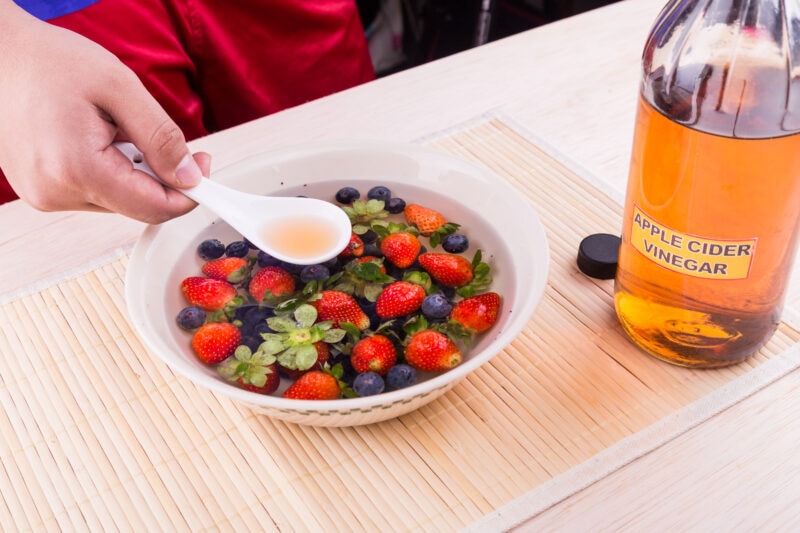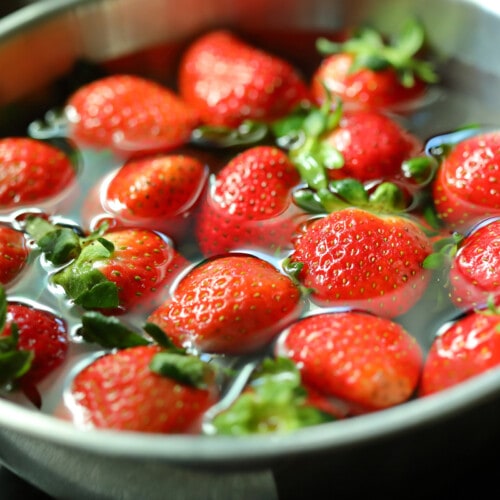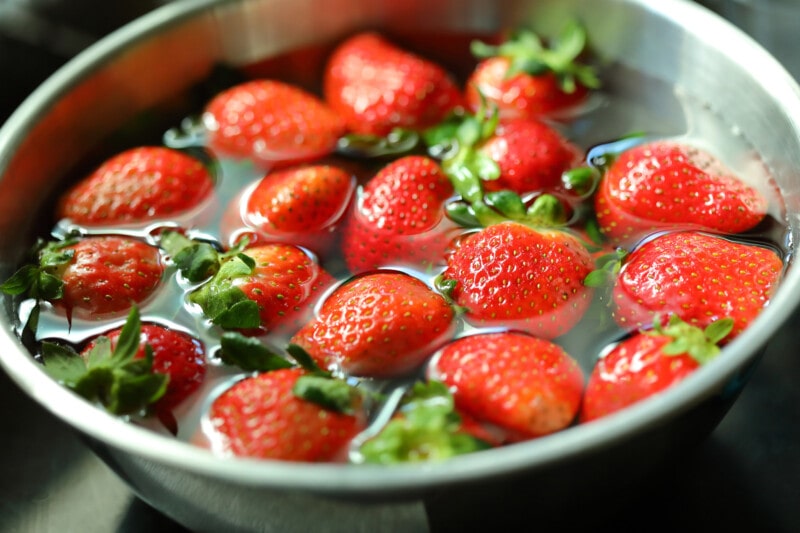If you’re washing your strawberries using plain water or wasting money on commercial fruit cleaners, stop right now. Because we’ve got better methods that are cheap, easy, and far more effective.
Keep reading to find out how to clean strawberries with vinegar and other effective inexpensive kitchen staples.
Table of Contents
The Best Way to Clean Strawberries: Vinegar
One of the simplest ways to remove chemicals and other impurities from your strawberries is with diluted vinegar.
Vinegar has long been celebrated for its disinfecting abilities. This liquid is acidic enough to kill bacteria and mold, but harmless when consumed. This special combination of characteristics is why vinegar has been used to preserve fruits and vegetables for centuries.
When mixed with water and used as a fruit soak, vinegar quickly kills bacteria, fungus, and other creepy crawlies on your strawberries. It also removes chemicals, pesticide residue, and dirt from the surface of the berries so they can be rinsed away.
But this deep clean does more than just make your fruit safer to eat; it will also help your strawberries last longer.
When fruit “goes bad” or spoils, it’s actually rotting. Rot is the process of microorganisms like bacteria and fungus eating the fruit. By killing most of these organisms using vinegar, your strawberries won’t go bad nearly as fast.
Best of all, this cleaning method isn’t just for strawberries. You can also use it to clean your blueberries, blackberries, raspberries, grapes, and most other fruits.

How to Clean Strawberries with Vinegar in 5 Steps
Cleaning your strawberries in vinegar is cheap, easy, and quick.
Step 1: Mix 4 cups of water with 1 cup vinegar in a large bowl. Be sure to use cool water.
Step 2: Add the strawberries to the vinegar water.
Step 3: Let them soak for 5 minutes in the cold-water-vinegar solution.
Step 4: Dump the vinegar solution and rinse the berries well under cold water.
Step 5: Spread the strawberries over a clean paper towel, then blot with a paper towel until dry.
A few tips:
- Don’t use warm water. Cold water is key to keeping your strawberries fresh and slowing the spoiling process.
- Make sure those berries are dry. Moisture also hastens the spoiling process by encouraging mold growth, so be sure to dry the strawberries thoroughly before storing them. If you don’t want to waste paper towels, you could dry the berries gently in a salad spinner.
- Use the right kind of vinegar. Distilled white vinegar is cheap and has the optimal acidity level to kill pathogens quickly, but apple cider vinegar will also work if that’s what you have on hand.
- Rinse well. Rinsing your berries multiple times under cold running water is key to getting rid of that vinegar flavor.
Cleaning Option 2: Baking Soda
Another great option you can use to wash strawberries that is almost as easy as vinegar is baking soda.
Baking soda is a mildly alkali substance that acts as a natural surfactant. When added to water and used to soak strawberries, it helps dissolve dirt and grime to remove them from the surface of the fruit.
This method won’t help preserve your fruit quite as well as vinegar. It also won’t get rid of chemical residue, but it’s an effective cleaning method for organic fruits and vegetables that are a little dirty.
Step 1: Mix 1 tbsp of baking soda with 4 cups of warm water.
Step 2: Soak strawberries in baking soda water for 5 minutes.
Step 3: Drain strawberries using a colander.
Step 4: Rinse the strawberries using cold tap water.
Cleaning Option 3: Salt
Washing strawberries and other fruits in salt water has been trending hard on social media lately. This is because a few influential consumers have noted that saltwater effectively kills bugs and bug larvae living in fruit.
Strawberries you purchase at the store aren’t likely to contain many of these creepy crawlers. The FDA regulates how “buggy” commercial fruit is allowed to be. But, if you grow fresh strawberries in your garden, then washing them with salt water is a great way to reduce how many fruit fly larvae you consume.
More importantly, a salt solution is also a good option for cleaning non-organic fruits and veggies. As it turns out, salty water is better at removing pesticides from the surface of fruits than water alone (3).
Step 1: Dissolve 4 teaspoons of salt in 4 cups of hot water.
Step 2: Allow the mixture to cool, then add your berries.
Step 3: Soak the berries in the cooled salt water for about 20 minutes.
Step 4: Rinse the strawberries in a colander under cool water then pat dry.
Why Clean Strawberries?
If you’re buying conventional strawberries, then there’s one very important reason you should clean them before use.
Strawberries are constantly featured at the top of the dirty dozen fruit and vegetable list. Why? Because these fruits get doused with pesticides during conventional production in order to keep insects and pathogens from destroying the fruits before they make it to the shelves.
Ninety percent of strawberries that make it to the market have at least one type of pesticide residue on them. And 30% have at least 10 detectable toxins on them(1). These pesticides have been linked to several health problems including cancer and hormone disruptions(2).
So, if you aren’t washing your strawberries before you eat them, now is the time to start!
Even USDA certified organic berries should be cleaned. This produce is farmed without chemical pesticides, but that doesn’t mean they haven’t been sprayed down with irritating organic concoctions. Plus, all strawberries harbor fungus, bacteria, and dirt.
Other Cleaning Options
There are many other fruit and vegetable cleaning recommendations out there. But in terms of effectiveness, safety, and staying green, the above three options are by far the best.
Soaps and detergents, such as those used to wash dishes, are not generally safe for use on food. The CDC recommends avoiding these products to wash produce as they may leave a residue that could make you sick.
Commercial produce washes come with varying levels of effectiveness. And some are made with less than green ingredients. But most importantly, these expensive options don’t do more to clean your food than what vinegar alone can do.
Expert Tip: The Best Way to Store Your Clean Strawberries
Once your berries are clean and dry, place them in an airtight container then put that container in the fridge.
Strawberries left in their original container or an uncovered bowl will be exposed to air. Not only can this introduce bacteria and mold spores to your clean strawberries but it will dry them out. An airtight container, such as a Tupperware, a bowl covered in plastic wrap, or a glass jar with a lid, works best.
Putting your strawberries in the fridge will also help them last longer. Mold grows fastest at room temperature and slowest at cooler temps. If you do see any moldy strawberries in your container, remove them right away.
Strawberries cleaned in a vinegar wash and then stored in an airtight container in the fridge will last for up to three weeks. Storing many types of fresh fruits this way will give them the longest shelf life.
FAQ
What is the best way to remove pesticides from strawberries?
Vinegar is the best way to remove pesticides from strawberries. Simply submerge the berries in a bath that’s four parts water to one part vinegar and let sit for 5 minutes. The acid in the vinegar will remove the chemicals from the fruit so it can be rinsed away.
Will my strawberries taste like vinegar if I soak them in vinegar?
No, your strawberries won’t taste like vinegar after you soak them. It takes time for vinegar to penetrate the surface of fruits and vegetables to change their flavor. By soaking your strawberries in a white vinegar bath for only five minutes, you get the cleansing effects of the acid without adding any vinegar taste.
What is the best kind of vinegar for washing strawberries?
Distilled white vinegar is the best option for cleaning strawberries and other fruit. It is effective and cheap. An equally effective option is apple cider vinegar, but this one costs more.
Our Favorite Strawberry Recipes
Now that you have clean strawberries at your disposal, you’ll need a way to use them up. Here are some of our favorite strawberry recipes for you to enjoy!
- Raw Strawberry Tarts – Sugar-free, vegan, and brimming with fresh strawberry flavor, these chocolatey mini tarts are bound to be your new favorite treat!
- Vegan Chocolate Covered Strawberries – Need I really say more?
- High Protein Baked Oatmeal – These energy-packed oatmeal squares are topped with strawberries, blueberries, and bananas.
- Strawberry Daiquiris – If your strawberries start to wither, don’t throw them out. Throw them in the blender and enjoy this indulgent afternoon refreshment. Just be sure not to include any moldy berries.
Before you whip up any of these delicious strawberry recipes, make sure to clean your berries according to the steps on our strawberry wash “recipe” card, below. You can even print out this helpful reminder card and place it on your fridge for future reference.
And if you want more helpful tips like this, don’t forget to sign up for our newsletter.
Cleaning Strawberries Has Never Been Easier
To get your strawberries clean and remove fungus, dirt, and pesticides, all you need is a vinegar bath. But if you happen to be out of vinegar, baking soda or salt will also work in a pinch.
Have you tried our vinegar fruit wash method? Be sure to share your experience, questions, and comments in the box below.

How to Clean Strawberries with a Vinegar Fruit Wash
Ingredients
- 1 cup distilled white vinegar or apple cider vinegar
- 4 cups water
- 1 lb strawberries
Instructions
- Mix 4 cups of water with 1 cup vinegar in a large bowl. Be sure to use cool water.
- Add the strawberries. Let them soak for 5 minutes in the cold-water-vinegar solution.
- Dump the vinegar solution and rinse the berries well under cold water.
- Spread the strawberries over a clean paper towel, then blot with a paper towel until dry.
Recommended Tools & Products
Nutrition
- How to Pick the Perfect Watermelon For a Sweet Summer Treat - April 10, 2024
- Future Kind’s Foundations: A Multivitamin Made for Vegans - December 5, 2023
- Does Nutritional Yeast Go Bad? - November 28, 2023

